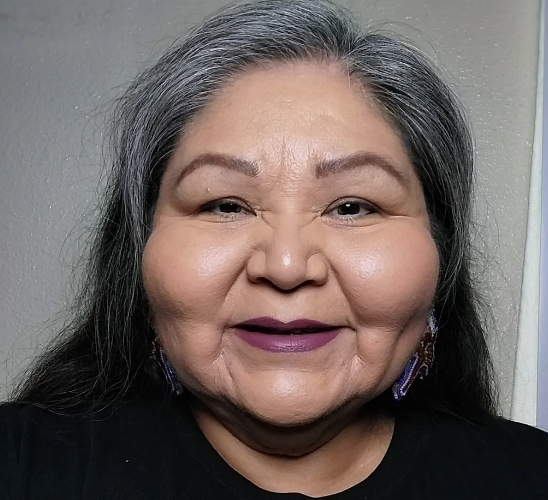
- Details
- By Native News Online Staff
Indigenous actor Elaine Miles says she was walking to a bus stop in Redmond, Wash. when four men wearing masks and vests labeled “U.S. Immigration and Customs Enforcement” stepped out of two unmarked black SUVs and demanded her identification, according to an account she shared on social media and in reporting by The Seattle Times.
Miles — best known for her roles in Northern Exposure, Smoke Signals, Wyvern and The Last of Us — said she handed the men her tribal ID from the Confederated Tribes of the Umatilla Indian Reservation in Ore. Tribal IDs are recognized by federal agencies, and Miles has used hers to travel across the U.S.-Canada and U.S.-Mexico borders without issue, The Seattle Times reported.
But Miles said one of the men dismissed the card as “fake,” while another told her, “Anyone can make that.”
Encounters between immigration agents and Indigenous people remain uncommon. Still, as immigration enforcement has intensified in the Seattle area, Miles’ experience has heightened concerns among Native communities, according to The Seattle Times. She said both her son and her uncle were previously detained by ICE agents who initially refused to accept their tribal IDs before releasing them.
“What we’re talking about here is racial profiling,” Seattle-based Indigenous rights attorney Gabriel Galanda, who is not representing Miles, told The Seattle Times. “People are getting pulled over or detained on the street because of the dark color of their skin.”
Miles’ encounter occurred the same day ICE conducted multiple arrests at Redmond’s Bear Creek Village shopping center, prompting strong local reaction. The Redmond City Council subsequently voted to shut off its Flock Safety license-plate-reading cameras, citing concerns that the technology could be used in immigration enforcement, The Seattle Times reported. There is no evidence the cameras were used in the arrests.
Miles said the men did not provide their names or badge numbers and that she feared they could have been bounty hunters. When they questioned her tribal ID, she pointed to the Umatilla enrollment office phone number printed on the back and urged them to call. When they refused, Miles attempted to call the office herself. She told The Seattle Times the men tried unsuccessfully to seize her phone before a fifth man whistled from an SUV, prompting the group to abruptly leave.
Galanda told The Seattle Times that the agents’ refusal to accept the ID reflects “a fair amount of ignorance about tribal citizenship generally in society and in government.”
Similar incidents have occurred elsewhere. An Indigenous woman born in Phoenix was mistakenly detained by immigration authorities after being released from jail in Des Moines, Iowa, before eventually being allowed to go free,
Galanda advises Indigenous people to carry multiple forms of identification and avoid escalating confrontations with immigration agents. While such detentions remain rare, he said they raise troubling questions.
For Miles, the incident has left lasting fear. She told The Seattle Times she is now afraid to leave the house alone or after dark, and her aunt and uncle ask her to check in each night.
“The prospect of the First Peoples being physically or forcibly stopped or detained is harrowing and reminiscent of this country’s original treatment of the First Peoples,” Galanda said. “It’s also deeply troubling that in 2025, the first people of this country have to essentially look over their shoulders.”
More Stories Like This
Native News Weekly (August 25, 2024): D.C. BriefsMonday Morning (March 2, 2026): Articles You May Have Missed This Past Weekend
Native News Weekly (March 1, 2026): D.C. Briefs
Scope Narrowed, Report Withheld: Questions Mount Over Michigan Boarding School Study
Zuni Youth Enrichment Project Announces Family Engagement Night and Spring Break Youth Programming
Help us defend tribal sovereignty.
At Native News Online, our mission is rooted in telling the stories that strengthen sovereignty and uplift Indigenous voices — not just at year’s end, but every single day.
Because of your generosity last year, we were able to keep our reporters on the ground in tribal communities, at national gatherings and in the halls of Congress — covering the issues that matter most to Indian Country: sovereignty, culture, education, health and economic opportunity.
That support sustained us through a tough year in 2025. Now, as we look to the year ahead, we need your help right now to ensure warrior journalism remains strong — reporting that defends tribal sovereignty, amplifies Native truth, and holds power accountable.
 The stakes couldn't be higher. Your support keeps Native voices heard, Native stories told and Native sovereignty defended.
The stakes couldn't be higher. Your support keeps Native voices heard, Native stories told and Native sovereignty defended.
Stand with Warrior Journalism today.
Levi Rickert (Potawatomi), Editor & Publisher


